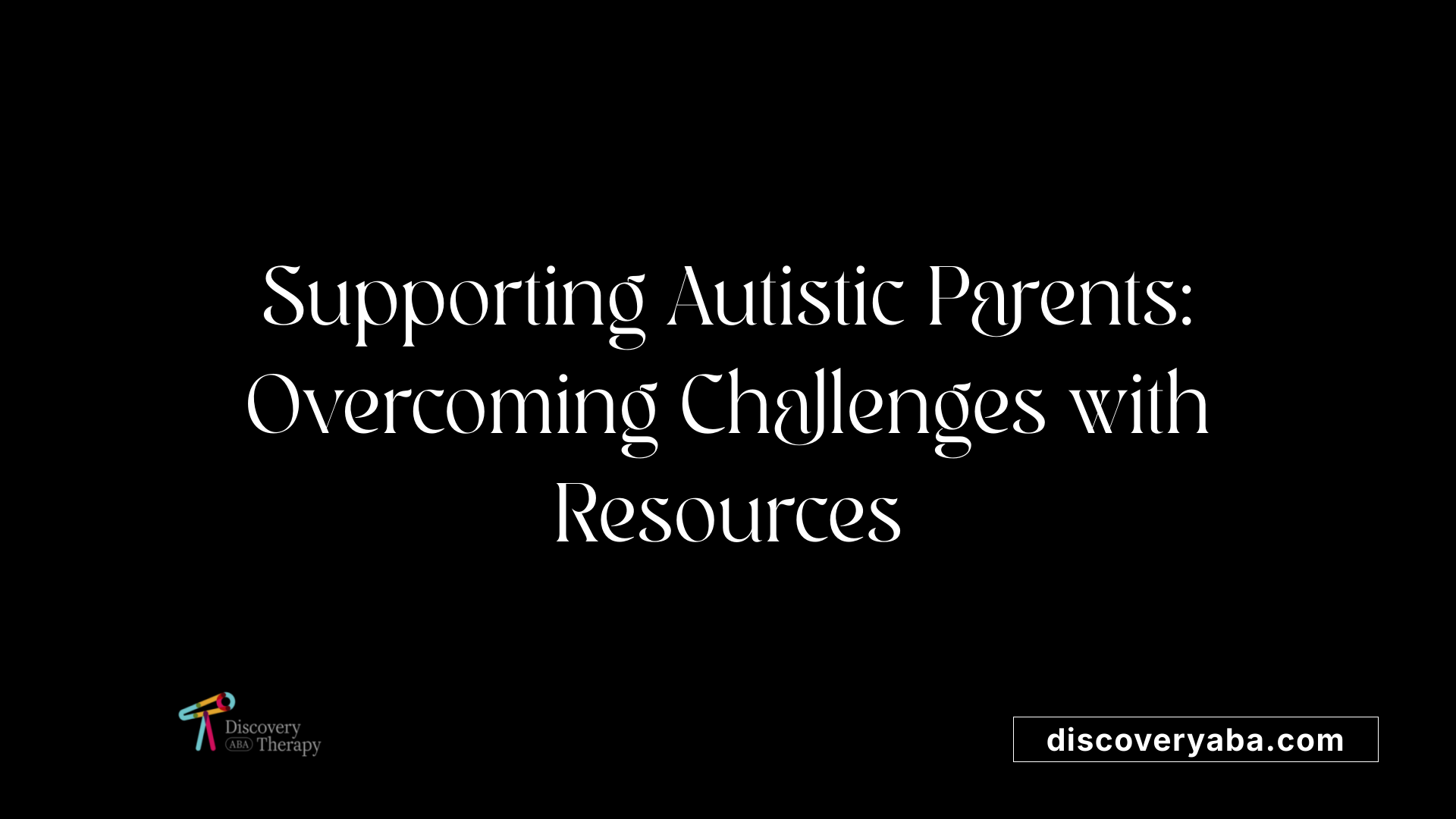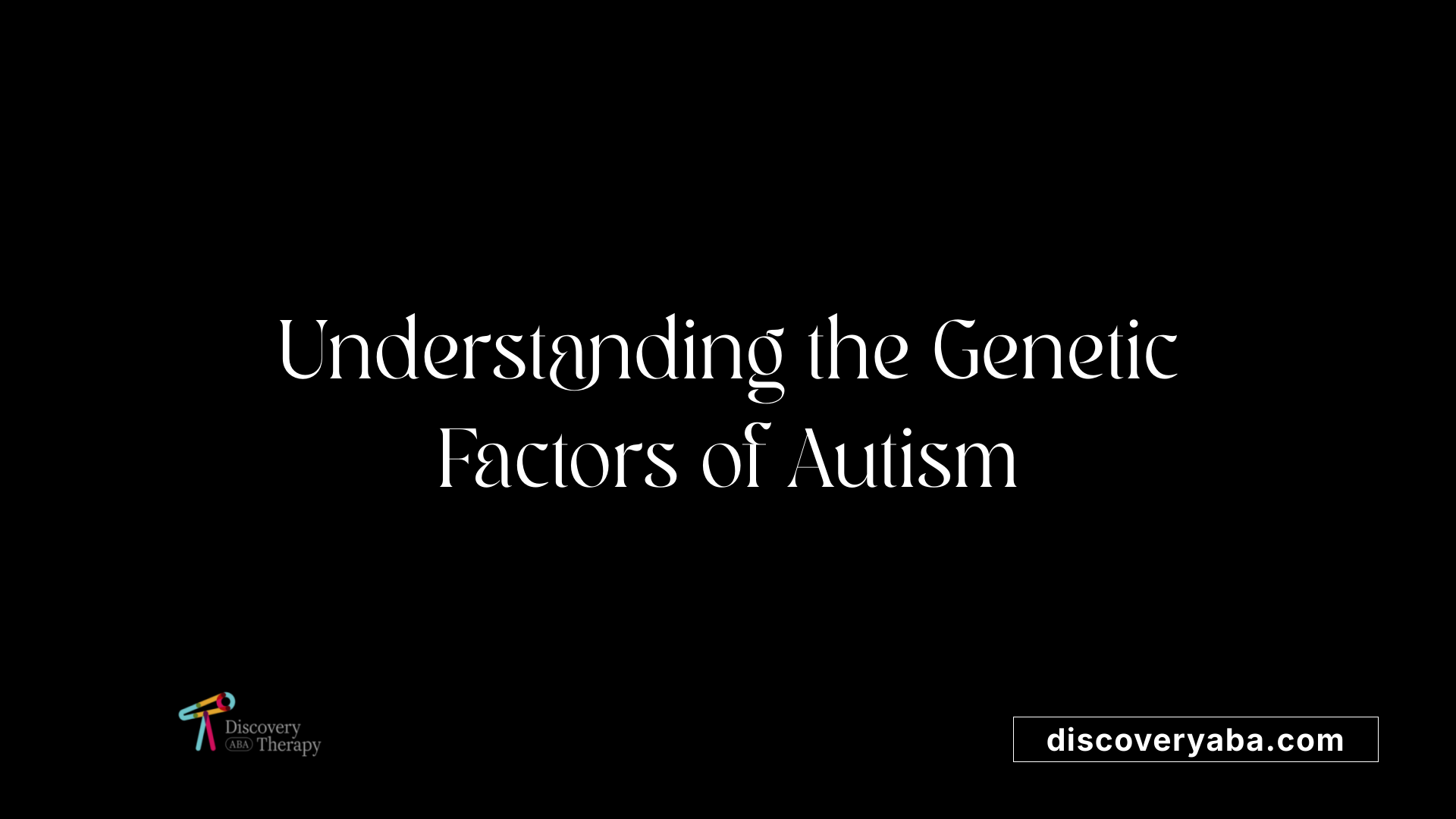Can Autistic People Have Kids?
Breaking Barriers: Parenting and Parenthood Possibilities for Autistic Individuals

Understanding Parenthood in the Context of Autism
Autism spectrum disorder (ASD) is a lifelong neurodevelopmental condition that affects social, communication, sensory, and behavioral aspects of an individual’s life. Despite ongoing misconceptions and societal challenges, autistic individuals are fully capable of becoming parents. This article explores the facts about autism, its heritability, and the possibilities for autistic people to have children, along with considerations and support systems available. Addressing questions with evidence-based insights, we highlight that autism does not inherently prevent parenthood and emphasize the importance of support, acceptance, and understanding.
Can Autistic People Get Married?

Can autistic people get married?
Autistic individuals are fully capable of getting married and forming meaningful relationships. Many autistic people experience loving partnerships that are just as fulfilling and lasting as those of neurotypical individuals.
Marriage offers opportunities for connection, companionship, and mutual support. With proper understanding and communication, autistic individuals and their partners can navigate challenges like social cues, sensory sensitivities, and emotional regulation.
Open and honest discussions about autism and personal needs are vital within a relationship. Such transparency fosters trust and helps both partners to understand and accommodate each other's unique perspectives.
Supportive strategies, including clear communication, sensory accommodations, and sometimes seeking professional guidance, can greatly enhance relationship satisfaction. For example, discussing sensory preferences and triggers, or establishing routines, helps create a harmonious environment.
Overall, autism does not bar someone from having a loving, successful marriage. Many autistic people have positive, fulfilling partnerships, especially when there is mutual understanding, patience, and effort to address specific relationship challenges.
Autism and Parenthood: Key Considerations

Can autistic individuals have children?
Autistic individuals are fully capable of becoming parents. Despite facing specific challenges such as sensory sensitivities, communication difficulties, and social interaction differences, many autistic parents effectively nurture and raise their children. Recognizing their own needs through diagnosis and self-awareness enables autistic parents to seek targeted support and develop coping strategies.
Autistic parents often possess strengths like heightened empathy, strong focus, organization, and keen observational skills, all of which can positively influence their parenting.
Genetic studies show that autism has a high heritability, implying that autistic individuals can have children who are neurotypical or autistic, depending on various genetic and environmental factors. Parenthood is achievable for autistic individuals regardless of their diagnosis.
With adequate support systems, self-acceptance, and community resources, autistic parents can provide loving, supportive, and nurturing environments for their children. Empowering autistic individuals through education and accessible resources helps ensure they can meet their parenting goals and foster healthy family dynamics.
Special Challenges and Support for Autistic Parents

Are there any special considerations or challenges for autistic individuals who want to become parents?
Autistic individuals aspiring to parenthood often face unique challenges related to sensory sensitivities, social communication differences, and societal stigma. Sensory overload is common, where loud noises, bright lights, or unfamiliar environments can cause distress. These sensory issues may make everyday parenting tasks like attending doctor appointments or managing busy environments more challenging.
Communication differences, including limited speech, difficulty interpreting social cues, or challenges understanding others' emotions, can impact interactions with children and support networks. Managing these difficulties may require tailored strategies, such as visual aids or alternative communication methods like Sign Language or augmentative devices.
Societal stigma and misconceptions about autism and parenting can lead to discrimination or unwarranted child removal. Historically, many autistic parents have been unjustly judged as incapable of providing proper care.
To navigate these challenges, access to specialized resources and support is crucial. Support networks involving family, friends, autism advocacy organizations like Autism Speaks, and community-based services can provide emotional and practical guidance. Education about autism for support professionals improves understanding and accommodation.
Building a personal support system that includes healthcare providers, therapists, and trusted community members can help autistic parents develop tailored parenting strategies.
Self-care and proactive planning are also essential. Strategies such as using noise-canceling headphones, scheduling quiet times, and creating sensory-friendly spaces within the home help manage overloads.
With the right resources, understanding, and social support, autistic individuals are fully capable of nurturing their children effectively. Emphasizing strengths and providing accommodations enables autistic parents to create loving and stable environments for their families.
Genetics and Autism: Inheritance and Spontaneous Mutations

What are the chances of having an autistic child if one parent has autism?
The likelihood of an autistic parent having a child with autism is significantly higher than in the general population due to the strong genetic component of the condition.
Research estimates that heritability of autism ranges from 80% to 90%, indicating that genetics play a dominant role in its development.
Many genes involved in brain development, neural connectivity, and sensory processing are associated with autism risk. These may be inherited from parents or arise through spontaneous mutations.
Inherited genetic mutations account for a large proportion of autism cases, especially when there is a family history. However, spontaneous or de novo mutations—genetic alterations that occur anew in the affected individual—are also significant, particularly in families where only one child is affected.
De novo mutations often happen during the formation of sperm and eggs, and are not inherited from the parents' genetic material but appear for the first time in the affected child.
While having an autistic parent increases the probability of autism in their children, it does not guarantee it. The chance depends on various factors, including the specific genes involved and environmental influences.
Genetic counseling can help prospective parents understand their individual risk levels based on family history and genetic testing.
Overall, genetics are the primary factor influencing autism risk, with spontaneous mutations contributing to some cases. It remains possible for autistic individuals to have neurotypical children, and the exact risk varies on a case-by-case basis.
Autism’s Genetic Impact on Offspring: What Parents Should Know

How does inheritance influence autism risk?
Autism has a strong genetic component, meaning it can run in families. Studies show that if one parent, especially an autistic parent, has autism, their children face an increased likelihood of also being diagnosed. This is due to inherited gene mutations that can elevate autism risk.
Heritability estimates suggest that roughly 50% of the risk for autism is genetic. Multiple genes contribute to the condition, and specific mutations can be passed down from parents to children. Notably, some genetic mutations associated with autism are inherited, while others, called de novo mutations, happen spontaneously during the formation of reproductive cells.
What are de novo mutations and how do they relate?
De novo mutations are genetic changes that occur in the sperm or egg of a parent or early in embryonic development. These spontaneous mutations are not inherited from either parent but can still contribute significantly to autism. Research estimates that up to half of autism cases with a single affected child result from such mutations.
Are environmental factors also involved?
Environmental influences during pregnancy, such as exposure to toxins, infections, or maternal health issues, can interact with genetic factors to influence autism development. While genetics play a critical role, these environmental factors can affect whether genetic susceptibility results in autism.
Risk factors and their influence
Certain factors increase the likelihood of autism in children:
- Family history of autism or related genetic conditions
- Parental age, especially advanced paternal age, which is associated with higher spontaneous mutation rates
- Genetic syndromes, like fragile X or Rett syndrome
- Prenatal exposures to toxins or infections
What is the likelihood that an autistic parent’s child is also autistic?
Having an autistic parent modestly raises the chances that their child could have autism, but it is not a certainty. The process involves complex genetic interactions and environmental factors. Many children with autistic parents are neurotypical, and autism can occur even without a family history.
| Aspect | Details | Additional Info |
|---|---|---|
| Inheritance patterns | Polygenic, involving multiple genes | Both inherited and de novo mutations |
| Common genetic factors | Risk genes like FMR1, SHANK3 | Identified through genetic testing |
| Environmental influences | Toxins, infections during pregnancy | Impact varies based on timing and exposure |
| Paternal age | Higher age linked to increased risk | Due to mutations in sperm cells |
| De novo mutations | Spontaneous during egg/sperm formation | Account for about 50% of autism cases in some studies |
Final thoughts
Autism is a complex condition influenced by a blend of genetic and environmental factors. An autistic parent can have a neurotypical child or an autistic one, depending on the specific mutations inherited or occurring spontaneously. While genetics play a significant role, they are only part of the picture. Many families benefit from genetic consultation and early interventions to support their children’s development.
Reproductive Possibilities for Autistic Couples and Individuals
Can two autistic people have children?
Autistic individuals are fully capable of becoming parents, and many do so successfully. Autism is primarily a neurodevelopmental condition characterized by differences in social interaction, communication, and sensory processing, but it does not inherently impair fertility or the biological ability to conceive and raise children.
Research indicates that autism has a strong genetic component, and autistic traits tend to be more common among couples where both partners are autistic. This pattern suggests some degree of active assortment—people with similar neurodevelopmental profiles often form relationships, which can influence reproductive choices.
Despite the potential for genetic factors linked to autism—such as FMR1 mutations associated with fragile X syndrome—to influence fertility, these are specific conditions that can often be managed or treated with medical intervention. For example, some autistic individuals face challenges like early reproductive difficulties or infertility, but these can often be addressed through fertility treatments or assisted reproductive technologies.
Many autistic people, including those with reproductive challenges, choose to have children. Their ability to parent depends more on their individual health, support systems, and access to healthcare than on autism itself.
Overall, autism does not serve as a barrier to parenthood. With proper medical guidance, support, and understanding, autistic individuals and couples can and do embrace parenting roles, contributing to diverse and enriching family structures.
Reproductive health and medical considerations
Reproductive health for autistic people involves general health practices, awareness of specific medical issues, and access to appropriate support. Autism does not directly affect fertility, but some related health conditions—like hormonal or genetic disorders—may require medical attention.
Healthcare providers should offer inclusive, accessible reproductive counseling that respects neurodiversity. For some autistic individuals, sensory sensitivities or communication differences might make interactions with medical professionals challenging. Adaptations like clear explanations, visual supports, or sensory accommodations can improve the healthcare experience.
In cases where reproductive challenges occur, assisted reproductive technologies such as in-vitro fertilization (IVF) or fertility medications are options available to many. Additionally, genetic counseling can assist prospective parents in understanding inherited risks or genetic factors, especially if reproductive difficulties or family history concerns exist.
There are also social and legal considerations, including ensuring reproductive rights are protected and that individuals are supported in making informed decisions about parenthood. As with any prospective parent, autism should not be a barrier to accessing reproductive healthcare or exercising reproductive rights.
Supporting autistic people's reproductive choices involves education, reducing stigma, and providing tailored healthcare services. Ultimately, recognizing the capacity of autistic individuals to nurture and care for children fosters a more inclusive understanding of family and parenthood.
Is autism compatible with having children without autism?
Autistic individuals can absolutely have children who are neurotypical, meaning without autism. This is supported by research into autism’s genetic underpinnings, which indicates a complex inheritance pattern involving multiple genes and environmental influences.
Autism’s genetic basis involves variations in numerous genes, some inherited from parents and others occurring spontaneously. Not all genetic variations linked to autism are transmitted in a way that causes autism in the child. Many autistic parents have children who do not have autism, illustrating that having a genetic predisposition does not guarantee the condition.
Studies show that autistic parents often have neurotypical children. For example, genetic research comparing children conceived through assisted reproductive technologies with those conceived naturally finds no significant difference in autism-related genetic markers. This further suggests that genetic risk is not deterministic.
Certain genetic mutations, like those in the FMR1 gene associated with Fragile X syndrome, can influence reproductive health and autism risk. However, these mutations do not invariably lead to autism in offspring. Instead, they highlight the genetic variability and the multifaceted nature of autism inheritance.
Environmental factors during pregnancy, as well as gene-environment interactions, also play roles but do not alter the fundamental possibility: autistic individuals can and do have children who are neurotypical.
In summary, the potential for autistic individuals to have children without autism remains high. The complex genetics of autism allow for a wide range of outcomes, and many parents on the spectrum have children without the condition, reflecting the diversity in inheritance patterns and the importance of environmental influences.
| Aspect | Explanation | Additional Notes |
|---|---|---|
| Inheritance | Autism risk is genetic but not deterministic. | Many genetic factors involved, some inherited, some spontaneous. |
| Genetic Variations | Not all variations lead to autism. | Variations may be passed down without causing autism. |
| Neurotypical Children | Possible and common among autistic parents. | No strict genetic linkage guarantees autism in offspring. |
| Reproductive Success | Autism does not impair the ability to conceive or parent. | Many autistic individuals are capable of having healthy children. |
| Environmental Factors | Influence autism risk but do not prevent having neurotypical children. | Prenatal environment can modify risks. |
This genetic and environmental complexity underscores that autism does not prevent individuals on the spectrum from having children without autism. Support, understanding, and personalized counseling can assist prospective parents in making informed reproductive choices.
Moving Forward with Confidence and Support
The capacity for autistic individuals to have children is well-supported by scientific evidence and societal commitment to equal rights. Parenthood involves more than genetics; it encompasses love, care, effort, and support. With the right community, medical, and social resources, autistic people can and do become nurturing, effective parents. Society must continue to challenge stigma, expand support systems, and advocate for the rights of all prospective parents. Parenthood is a fundamental human activity, and autism is no barrier to its realization. Embracing neurodiversity and supporting autistic parents will foster more inclusive, understanding families and communities.
References
- Parenting: Our Right to Have Children and Start a Family
- Help for families of autistic people
- Where does autism come from when it doesn't run in the ...
- What is autism
- Autism Spectrum Disorder (ASD) Symptoms & Causes
- What is autism?
- Autism
- Signs that a child or adult may be autistic
- The Strengths and Struggles of Being an Autistic Parent
- When children with autism become adults - PMC
Does Your Child Have An Autism Diagnosis?
Learn More About How ABA Therapy Can Help
Find More Articles
Contact us
North Carolina, Nevada, Utah, Virginia
New Hampshire, Maine
Arizona, Colorado, Georgia, New Mexico, Oklahoma, Texas
.avif)




































































































